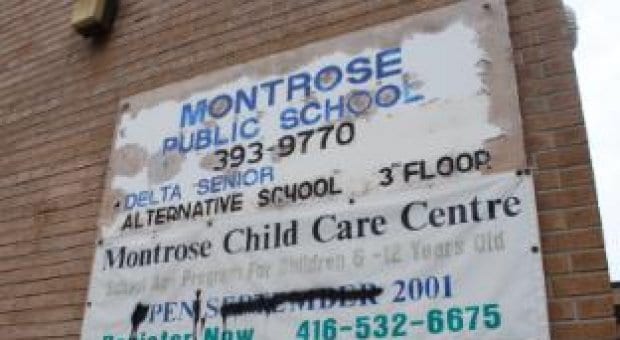
A portion of the AIDS Committee of Toronto poster that was posted in the Delta Alternative Senior School Grade 7 and 8 classroom. Credit: ACT

Credit: ACT

ACT sexual health posters intended for gay bars and bathhouses were removed from a Toronto classroom following a complaint to the Toronto Sun. Credit: ACT
Parents at Toronto’s Delta Alternative Senior School have expressed support for a teacher they say is being vilified for using a poster originally designed for gay bars and bathhouses in his Grade 7 and 8 classrooms.
Someone complained to theToronto Sunabout the posters, one of which states, “Use your head when giving it: blow job tips.”
Another says, “If you like to fuck,” with safe sex tips for gay and bisexual men. The AIDS Committee of Toronto (ACT) publishes both posters, which have been on display in the classroom since October.
Queer parent Emily Paradis says parents knew about and approved the posters, which she calls “gay-positive and sex-positive” sexual health information.
“It’s really important that parents like me speak out against this moral panic in the coverage surrounding this issue so far,” she says. “I feel it’s important that kids hear a strong sex-positive message coming from us.”
The teacher, Wade Vroom, an occasional teacher and independent filmmaker, has been placed on “home assignment” while an investigation is conducted, says Toronto District School Board spokesperson Ryan Bird. Vroom could not be reached for comment.
“Home assignment is not a disciplinary action,” Bird says. “The review is trying to determine what led up to [acquiring the posters]. We will have conversations with the people involved to answer all the questions that both the school and the board want to find out.”
Principal Marc Mullan did not respond to Xtra‘s request to comment.
Paradis says any backlash against Vroom is rooted in homophobia. “I’m disappointed that the school and the board seem to have gone into damage control mode about this instead of standing up for the importance of sexual health education and speaking out against blatant homophobia. I really think the administration needs to show some leadership on this, and so far that hasn’t been the case.”
Ann Rauhala, co-chair of the school’s parent council, says that about 80 people attended a May 8 meeting at which parents expressed “overwhelming” support for the teacher and a strong “resistance to homophobia.”
“At one point I asked for a show of hands,” she says. “And the large majority showed strong support for the teacher. Many spoke eloquently in support of his, and Delta’s, nuanced approach to educating students about sex.”
Paradis, who attended the meeting, says she wants her son to learn about the spectrum of human sexuality, including queer sexuality.
“Students are exposed to a variety of images, language and concepts on Facebook, in video games, on the internet and even in ad campaigns on billboards,” she says. “None of those sources are showing them any gay-positive imagery, or even any sex-positive imagery. Usually the images they see rely on sexism, racism, negative power dynamics and heteronormativity.”
School administrators removed the brochures following the original media story. Rauhala doesn’t know who complained to Sun News. “I think it’s really insulting that someone, and some media, feels the need to protect parents from something we don’t need to be protected from,” she says.
Bird says removing the posters was not a knee-jerk reaction to media reports. “It was the nature of the content and the way it was explained in the pamphlet. It was just inappropriate for the classroom,” he says.
Kyle Greenwood, manager of communications for ACT, says the information is not intended for use in schools.
“Those are outreach materials used for a particular audience: gay men,” he says. “They are materials we give out to bathhouses and gay bars. We create them with that intention. For that reason, we use language and imagery that the communities we work with respond to.”
Some Delta students have created a petition calling for the teacher to be reinstated, Rauhala says, noting she values the progressive education her daughter receives at the school. She says the posters are just one component of a larger sexual health education program developed in collaboration with parents, teachers and health professionals. The program incorporates information on harm reduction, safe sex and respect for diversity.
Both Rauhala and Paradis say the issue illustrates a widening gap in the provincial education curriculum for sex-positive sexual health information.
“After my initial shock at seeing those adult materials, I realized that there’s probably no visual materials that really convey a range of sexuality in an age-appropriate way,” Paradis says.
It’s been 15 years since the Ontario government last updated guidelines for teaching young people about sexual health. The curriculum used today does not require teachers to include material about gay and lesbian sexuality.
In 2010, the Ontario Liberals announced an updated sexual health curriculum but promptly shelved it after religious groups expressed outrage. Then-premier Dalton McGuinty promised to conduct further consultations with parents that never materialized.
In January, newly elected Premier Kathleen Wynne once again committed to moving the file forward. But since Wynne’s election, the Ministry of Education has remained silent on the issue.
“If people were truly in touch with what life was like for your average 13- or 14-year-old in downtown Toronto, they might have known that this is stuff that we all have to face and contend with as parents, and we need all the best information that we can get,” Rauhala says.
“Parents recognize the need for, and the lack of, information targeted for teenagers on the whole range of sexual health and safety issues.”

 Why you can trust Xtra
Why you can trust Xtra


